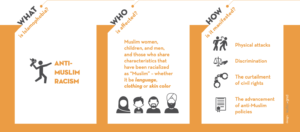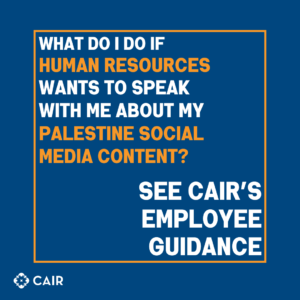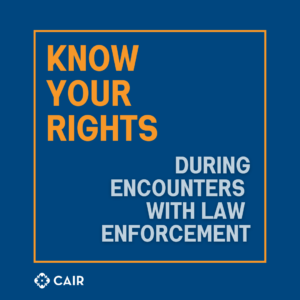Recently, CAIR released guidance focused on speech rights in educational settings and addressing any bullying that may result, including tools for advocates to protect themselves from doxxing. The organization encourages all students experiencing interference or suppression of their free speech in educational settings or facing bullying to document it and contact us.
CAIR is also issuing new guidance here to students and advocates seeking to speak and advocate effectively and safely in support of Palestinian human rights.
Speaking Effectively
-
- Audience comes first. If you are speaking, you are attempting to convince an audience that your position is correct. That means speaking to where they are at, not where you are at. If a person is afraid of heights, telling them not to fear heights is ineffective. You have to spend the time and use the aurguments that bring them to that understanding.
-
- Connect through shared values. What values do you have in common with your audience? Connecting with your audience through values such as the value of human life, opposing oppression, fighting apartheid wherever it appears is a better place to start than reciting facts and figures.
-
- Are you the right person? Be honest with yourself. Do you easily lose your temper? If this is true of you, then contributing to problem solving in ways other than as a public speaker may be of better service to the cause.
-
- Tell a story. A 30 second example about an individual human being’s suffering can be more effective than reams of statistics. Here is a recent example from CAIR: “Faten Odeh, the interim executive director of the Cleveland chapter of the Council on American-Islamic Relations, denounced the violence against innocent Israelis but wanted people to know that Palestinians have been suffering at the hands of Israel for decades. Her late father-in-law was recently oppressed while trying to receive cancer treatment in Palestine, she said. “Can you imagine? He had to actually ask for permission from his occupiers simply to travel to where he needed to go in Palestine, the country of his birth, simply to receive life-saving treatment,” Odeh said.
-
- Know the facts. The Center for Security, Race and Rights at Rutgers University is offering a free online fact-based teach-in on Gaza. They also offer online resources. If your organization or network of allies is interested, please email [email protected]
-
- Know what you plan to say. Imagine: if you got to write the headline of a news article about what you are saying, what would that headline say? Experienced spokespeople think about three key points they plan to make in their interviews, their headlines, and repeat them. Repetition is key to helping your audience hear and remember your key points.
Advocating Effectively
CAIR first directs you to the following resources developed to guide advocates for Palestinian rights:
In addition, consider the following tips:
-
- Offer a solution. It’s easy to criticize and condemn. The best leaders offer a vision that leads to a good outcome. All reasonable people want the violence to stop. The only way to permanently stop the violence is to end the occupation, which kills hundreds of Palestinian civilians every year and subjects millions more men, women and children to systemic, racist oppression.
-
- Work toward a solution. Simply arguing with people, particularly people who cannot impact whatever problem you are working on, is not the best investment of your time. Numerous professional organizations are working on this issue. Follow them on social media and act when they ask you to. Share their material to help them reach and mobilize more people.
Tips for New Advocates
Sharing opinions on social media and other public platforms is a common and powerful way that students and activists share their support for Palestinian human rights. However, because of the public nature of those interactions, it is easy for others to document your posts and reshare them to pressure you into silence, oftentimes by drawing the attention of cyberbullies and/or threatening future career or educational prospects. In the past, activists and students who have shared information supporting Palestinian human rights have experienced:
-
- Threatening posts on social media
-
- Targeting via websites explicitly designed to profile and intimidate Palestinian activists
-
- Harassment from school administrators
-
- Threats to their career and/or educational prospects
To be clear, it is possible to – and many people do – promote Palestinian human rights while avoiding these consequences. Many of the intimidation tactics that are used against activists result from their ability to tie you to concrete evidence of information that you have shared online. In order to avoid these tactics or mitigate their impact, it is important to take several considerations into account before sharing:
If you are posting on social media or email listservs, consider:
-
- Am I comfortable with what I am sharing? Sometimes, in times of urgency, we share information quickly without fully reviewing the information. But remember that information online is out there, even if you delete it later. Moreover, it is unlikely that legal action can be taken to remove posts or sites that republish information that you have already endorsed. Take an extra moment to be sure that you are in full agreement with the information you are sharing. If you are reposting the information, review the original author of the post and ensure that they are a credible source and that you fully agree with their stance. Even if you agree with their post, they may hold other beliefs you find questionable and that may be later linked to you by cyberbullies.
-
- Do I know who has the ability to view my social media account? If you want to share your opinions but are worried about others who you do not follow you recording your statements, consider changing your account to private. If you decide to change to private, it is also possible to remove followers from your account who you do not want to interact with your posts. Several platforms, like Instagram, also allow you to change who can view your story, even if your account is public, and others, like Twitter/X, allow you to restrict who can comment. It is also possible to create a separate account that does not contain information that can be used to identify your background in order to feel more comfortable sharing your opinions publicly and responsibly.
-
- Do I know who has the ability to view my email on a listserv? Listservs are commonly used in university settings, and they are more difficult to limit in terms of who can see your content. You may not have access to the list of members on the listserv, and other members can screenshot and forward your emails to others. Again, be sure that you are comfortable and confident defending the information you are sharing and that you are not violating any of the regulations of the listserv by doing so. If you decide to share information on a listserv, a good tip is to have other contacts on the listserv – friends, or even an administrator of the listserv – who can support you if your post receives backlash. They can respond on your behalf, or even help you report any hateful posts, as they may violate the rules of the listserv.
If you are signing a statement, consider:
-
- Am I in full agreement with the content of this statement? Again, it is important that you are aware of and prepared to defend opinions that you endorse. Statements are often crafted by an organization or student group that holds its own particular opinions. Signing on is an endorsement of these views, so be sure that you agree with every sentence, and not just the general ‘gist’ of the statement. For example, many statements may support Palestinian human rights, but they may advocate for very different means.
-
- How visible is this statement? When we sign statements, we sometimes do not realize how far it will be shared. When you are considering signing your name onto a statement, ask the organizers where and with whom they plan on sharing the statement. The statement may be sent to the university’s offices, for example, where it is less likely to be shared on social media and garner the attention of cyberbullies. Naturally, however, keep in mind that any public statement can be shared widely, even if that is not the intention of its organizers.
-
- How widespread is this statement? If the statement is authored by a prominent organization and/or is receiving wide support from multiple people and organizations, it is possible that your name may be listed among a much larger list of names, which increases your exposure to various audiences but also minimizes the chance that you will be individually targeted. Similarly, a consequence of less popular statements is your name may be easier to locate for those who may seek to cause harm to you, even if it is not seen by many.







